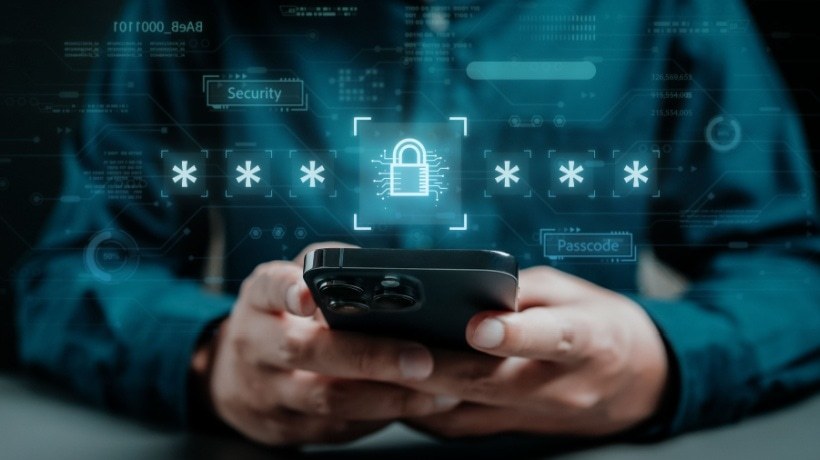# Mobile Security For Employees: 6 Tips To Ensure Your Phone Is Safe
With more and more employees working remotely or traveling for work, using a mobile phone for business purposes is becoming increasingly common. In fact, many companies provide their employees with mobile phones to help them stay connected and be more productive. However, the safety of accessing company networks and projects through a mobile device, like a smartphone or tablet, can be catastrophic to your company's data security.
## Why Does Mobile Security Matter For Employees?
Using your mobile phone for work can be very convenient. Checking your emails while commuting, forwarding a document without having to turn on your laptop, etc., can simplify your everyday life. However, the danger of data theft or a security breach is ever-present, and it can have severe consequences on your company's reputation, financial state, and client relationships.
Often, it doesn't take more than clicking on a link in a phishing email to allow cybercriminals access to sensitive information regarding the company or its clients. Therefore, any company that values its brand and the trust of its clients must educate its workforce on a few necessary mobile security guidelines to keep them safe.
## 6 Tips To Guarantee Mobile Security For Employees
### 1. Use Strong Passwords and Biometric Passkeys
The first and most important step of mobile security is ensuring that you are the only person who can physically access your phone. Use a strong PIN or password to unlock it (not 0000 or 1234) or, better yet, use your phone's biometric passkeys, such as face and fingerprint scanning. In the unlikely event that your phone is left unlocked and unattended, make sure that important work or banking apps require a password to open.
If you are using a username and password, refrain from selecting the "Remember me" option, as this only makes it easier for other people to access your accounts. Finally, remember to change your passwords every few months to keep them secure.
### 2. Enable Virtual Private Network (VPN)
VPNs stand for Virtual Private Network, and they are commonly used on computers and laptops. If you are accessing the internet through your smartphone, especially using public Wi-Fi networks, you should definitely consider downloading a VPN. This technology enables you to access the internet safely by creating a barrier between your device and the Wi-Fi network, encrypting your information and safeguarding it from cyberattacks.
VPN software is often inexpensive, but the protection it provides is invaluable.
### 3. Be Careful With Unknown Wi-Fi Networks
Everybody loves free Wi-Fi when working outside the home, but what if the real price you're paying is your mobile security? Public networks in cafes or hotels often lack encryption, making your information easily accessible to anyone with basic hacking skills. Before you know it, whatever you are working on and the credentials you use to access important websites or applications can fall into the hands of people with malicious intent.
Given the risk, it's definitely safer to use your mobile 4G or 5G network, which automatically encrypts information. If you are running low on data, however, then use a VPN and only connect to password-protected Wi-Fi networks.
### 4. Keep Your Mobile Phone Secure
It's good to take precautions to ensure mobile security, such as using passwords, installing VPNs, and backing up your data. However, the best-case scenario is that you don't end up needing them because you are careful when using your phone to access the internet.
Of course, this doesn't mean getting paranoid over every email and website, and, ultimately, avoiding using your phone for anything of importance. Instead, you just need to keep an eye out for suspicious behavior, emails from unknown senders, clickbait pop-ups, and downloads from untrustworthy sources.
### 5. Secure Mobile Usage For Remote Employees
When employees work outside the office more often than on-site, it might be challenging to monitor how safe their mobile phone usage is. To fortify your business against outside threats as much as possible, it's essential that you instill in your remote workforce a mobile security mentality that they will keep up without needing someone to look over their shoulder.
Direct them to resources about what can happen when they leave their devices unprotected, and organize courses about online security. Additionally, you can use a mobile device management (MDM) tool, which allows you to remotely ensure that the smartphones given to employees comply with the latest security standards and are, therefore, secured.
### 6. Monitor Mobile Usage
As remote work becomes more popular and employees increasingly use their phones to complete work-related tasks, mobile security is becoming more important than ever. If employees don't know how to keep their mobile devices secure, their companies might suffer serious consequences.
In this article, we discussed a few must-know tips about safeguarding smartphones and tablets against cyber attacks, which every company must urge their workforce to adopt.
